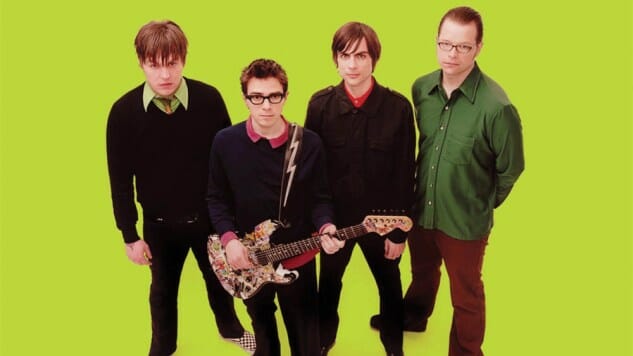The War Over Weezer Is Real on Saturday Night Live

It’s a war that’s been raging since Weezer released its second album over 22 years ago. Has the band lost it? And if so, exactly when and why?
Pinkerton was released to a collective shrug by the entire world in 1996. Weezer’s second album might’ve hooked a certain type of fan desperate for self-loathing songs about romantic failure, but for a world gearing up for the twin 1997 eruptions of Third Eye Blind and Matchbox Twenty, Weezer felt like yesterday’s news. They were just one more band that scored an alternative radio hit in the wide open days of 1994, another Belly or Dinosaur Jr that would release a follow-up album in a media landscape that no longer let anything but the most polished and photogenic corporate alternative rock bands through the gates. Some accused Weezer of being that kind of band when their 1994 debut came out—a common complaint was that they were just a cleaned up, more mainstream-friendly knockoff of Pavement—but the songs were good enough (and videos clever enough) to make them a success.
Times had changed by 1996. The major labels had successfully reined in an “alternative” scene that they had struggled to understand earlier in the decade, blandly homogenizing it in a way that left little room for idiosyncrasy. Pinkerton’s first single, “El Scorcho,” was too lilting and haphazard to fit on commercial alternative playlists in 1996, and that was basically that. A follow-up single, “The Good Life,” got a bit more play on MTV, but the message had already taken hold: Weezer was a one-hit wonder, a band bit hard by the sophomore slump. Pinkerton was considered a failure by the world at large, and it would take years for that impression to turn around.
The record’s reputation took a further hit after Weezer basically disappeared for five years. It wasn’t just a failure, but one that ended the band. It was genuinely surprising when Weezer returned in 2001 with a new album, and even more surprising that it did well, with a couple of radio hits and eventually going platinum. Alternative radio itself was dying by 2001, killed by the offputting anger of nu metal and the rise of hip hop as the universal music of youth culture, and Weezer felt even more out of place at the time than they did in 1996.
-

-

-

-

-

-

-

-

-

-

-

-

-

-

-

-

-

-

-

-

-

-

-

-

-

-

-

-

-

-

-

-

-

-

-

-

-

-

-

-








































